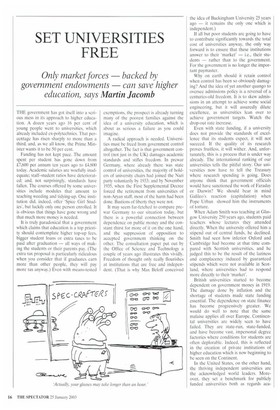SET UNIVERSITIES FREE
Only market forces — backed by government endowments — can save higher
education, says Martin Jacomb
THE government has got itself into a serious mess in its approach to higher education. A dozen years ago 16 per cent of young people went to universities, which already included ex-polytechnics. That percentage has risen sharply to more than a third, and, as we all know, the Prime Minister wants it to be 50 per cent.
Funding has not kept pace. The amount spent per student has gone down from 17,600 per annum ten years ago to £4,800 today. Academic salaries are woefully inadequate; staff–student ratios have deteriorated; and, not surprisingly, standards have fallen. The courses offered by some universities include modules that amount to teaching weeding and tidying-up. One institution did, indeed, offer 'Spice Girl Studies', but luckily only one person enrolled. It is obvious that things have gone wrong and that much more money is needed.
It is truly paradoxical that a government which claims that education is a top priority should contemplate higher top-up fees, bigger student loans or extra taxes to be paid after graduation — all ways of making the students or their parents pay. (The extra tax proposal is particularly ridiculous when you consider that if graduates earn more than other people, they will pay more tax anyway.) Even with means-tested exemptions, the prospect is already turning many of the poorest families against the idea of a university education, which is about as serious a failure as you could imagine.
A radical approach is needed. Universities must be freed from government control altogether. The fact is that government control (not just in the UK) damages academic standards and stifles freedom. In prewar Germany, where already there was state control of universities, the majority of holders of university chairs had joined the Nazi party voluntarily by 1933; and by November 1935, when the First Supplemental Decree forced the retirement from universities of non-Aryan staff, most of the harm had been done. Bastions of liberty they were not.
It may seem far-fetched to compare prewar Germany to our situation today, but there is a powerful connection between dependence on public money and the constant thirst for more of it on the one hand, and the suppression of opposition to accepted government thinking on the other. The consultation paper put out by the Office of Science and Technology a couple of years ago illustrates this vividly. Freedom of thought only really flourishes at institutions that are free and independent. (That is why Max Beloff conceived the idea of Buckingham University 25 years ago — it remains the only one which is independent.) If all but poor students are going to have to contribute significantly towards the total cost of universities anyway, the only way forward is to ensure that these institutions answer to their 'market' — i.e., their students — rather than to the government. For the government is no longer the important paymaster.
Why on earth should it retain control when control has been so obviously damaging? And the idea of yet another quango to oversee admissions policy is a reversal of a centuries-old freedom. It is to skew admissions in an attempt to achieve some social engineering, but it will assuredly dilute excellence, as universities lean over to achieve government targets. Watch the drop-out rate increase.
Even with state funding, if a university does not provide the standards of excellence that its students expect, it will not succeed. If the quality of its research proves fruitless, it will wither. And, unfortunately, this is a process that is under way already. The international ranking of our universities tells the pitiful story. Our universities now have to tell the Treasury where research spending is going. Does anyone think that government officials would have sanctioned the work of Faraday or Darwin? We should bear in mind Galileo's reaction (capitulation) when Pope Urban showed him the instruments of torture.
When Adam Smith was teaching at Glasgow University 250 years ago, students paid teachers whose lectures they attended directly. When the university offered him a stipend out of central funds, he declined. Smith had seen how inferior Oxford and Cambridge had become at that time compared with Scottish universities, and he judged this to be the result of the laziness and complacency induced by guaranteed stipends which were not available in Scotland, where universities had to respond more directly to their 'market'.
British universities started to become dependent on government money in 1919. The damage done by inflation and the shortage of students made state funding essential. The dependence on state finance has become progressively greater. We would do well to note that the same malaise applies all over Europe. Continental universities are widely seen to have failed. They are state-run, state-funded, and have become vast, impersonal degree factories where conditions for students are often deplorable. Indeed, this is reflected in the creation of private institutions of higher education which is now beginning to be seen on the Continent.
In the United States, on the other hand, the thriving independent universities are the acknowledged world leaders. Moreover, they set a benchmark for publicly funded universities both as regards aca demic standards and freedom from official interference.
The solution, though radical, is not impractical. The government should provide every university with an adequate endowment, and free them completely from government control. The amount needed would be much less than the .E22.5 billion that the government took out of the economy when it auctioned the 3G telephone licences. Moreover, it would cost the government nothing. For the endowment could consist of non-tradeable government bonds created for the purpose. The only cash involved would be the interest payable on the bonds, but this would be a replacement for the money now being provided which would no longer be needed.
In addition, the saving of the cost of the gigantic bureaucracy which now controls our universities would be enormous. After all, a large and expensive part of the DfES, the whole of the Higher Education Funding Council, and most of the other six (yes, six) quangos, could be done away with. The entire saving could go to increase the endowment income.
The bonds would never have to be repaid, but they would be much more than just an accounting entry. They would represent a perpetual promise to pay the endowment income. This would be vulnerable only to the re-emergence of inflation. To guard against this risk, the interest paid on the bonds could be index-linked.
The endowment income would cover only part of the cost of academic salaries and other overheads. The rest would come from the fees which the students are going to have to pay anyway. As a result, universities would thenceforth have to respond to their 'market'. If a university did not provide the courses and the teaching standards, and produce research work that end-users really valued, it would deservedly fail. This would guarantee improving standards; common sense tells you so.
The endowment funds would be held in trust, and the terms of the trust would include an obligation to pay the costs of students from poor backgrounds, in just the same way that scholarship funds have done for centuries. It would be essential, and simple, to ensure that entry for students was always 'needs-blind', so that no one would ever be excluded for want of means. This is the case at. for example. Harvard and other by League universities; a principle which is blatantly absent from all of the government's proposals that we have heard about so far.
Radical? When it is reported (inaccurately. I hope) that the Prime Minister considers that student-loan obligation could be made remittable if the student goes into 'acceptable' public-service jobs, you know that a radical solution is called for.
Sir Martin Jacomb is chancellor of the University of Buckingham.



















































































 Previous page
Previous page